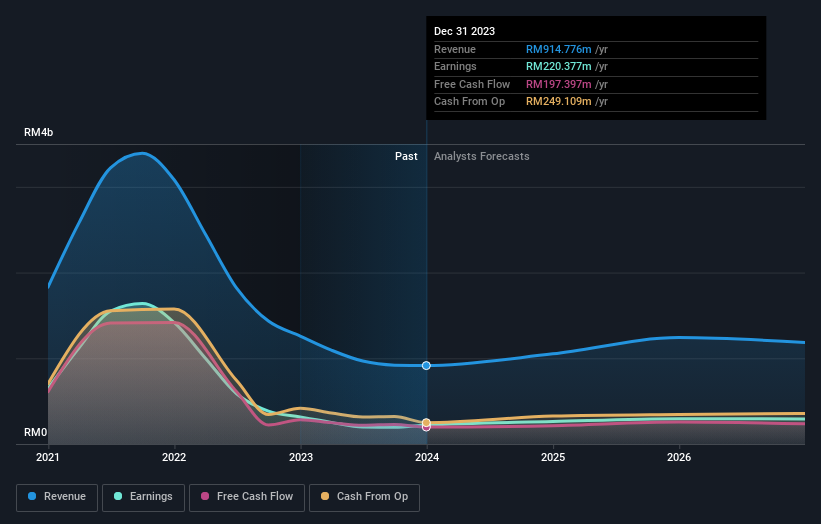With 65% ownership, Riverstone Holdings Limited (SGX:AP4) insiders have a lot riding on the company's future
Key Insights
Insiders appear to have a vested interest in Riverstone Holdings' growth, as seen by their sizeable ownership
51% of the company is held by a single shareholder (Teek Son Wong)
Ownership research along with analyst forecasts data help provide a good understanding of opportunities in a stock
If you want to know who really controls Riverstone Holdings Limited (SGX:AP4), then you'll have to look at the makeup of its share registry. The group holding the most number of shares in the company, around 65% to be precise, is individual insiders. Put another way, the group faces the maximum upside potential (or downside risk).
So it follows, every decision made by insiders of Riverstone Holdings regarding the company's future would be crucial to them.
Let's take a closer look to see what the different types of shareholders can tell us about Riverstone Holdings.
Check out our latest analysis for Riverstone Holdings
What Does The Institutional Ownership Tell Us About Riverstone Holdings?
Many institutions measure their performance against an index that approximates the local market. So they usually pay more attention to companies that are included in major indices.
As you can see, institutional investors have a fair amount of stake in Riverstone Holdings. This implies the analysts working for those institutions have looked at the stock and they like it. But just like anyone else, they could be wrong. When multiple institutions own a stock, there's always a risk that they are in a 'crowded trade'. When such a trade goes wrong, multiple parties may compete to sell stock fast. This risk is higher in a company without a history of growth. You can see Riverstone Holdings' historic earnings and revenue below, but keep in mind there's always more to the story.
We note that hedge funds don't have a meaningful investment in Riverstone Holdings. Looking at our data, we can see that the largest shareholder is the CEO Teek Son Wong with 51% of shares outstanding. This implies that they possess majority interests and have significant control over the company. Investors usually consider it a good sign when the company leadership has such a significant stake, as this is widely perceived to increase the chance that the management will act in the best interests of the company. For context, the second largest shareholder holds about 8.8% of the shares outstanding, followed by an ownership of 3.4% by the third-largest shareholder. Interestingly, the second-largest shareholder, Wai Keong Lee is also Top Key Executive, again, pointing towards strong insider ownership amongst the company's top shareholders.
Researching institutional ownership is a good way to gauge and filter a stock's expected performance. The same can be achieved by studying analyst sentiments. There are a reasonable number of analysts covering the stock, so it might be useful to find out their aggregate view on the future.
Insider Ownership Of Riverstone Holdings
The definition of company insiders can be subjective and does vary between jurisdictions. Our data reflects individual insiders, capturing board members at the very least. Company management run the business, but the CEO will answer to the board, even if he or she is a member of it.
Insider ownership is positive when it signals leadership are thinking like the true owners of the company. However, high insider ownership can also give immense power to a small group within the company. This can be negative in some circumstances.
It seems that insiders own more than half the Riverstone Holdings Limited stock. This gives them a lot of power. That means they own S$698m worth of shares in the S$1.1b company. That's quite meaningful. Most would argue this is a positive, showing strong alignment with shareholders. You can click here to see if those insiders have been buying or selling.
General Public Ownership
The general public, who are usually individual investors, hold a 25% stake in Riverstone Holdings. While this group can't necessarily call the shots, it can certainly have a real influence on how the company is run.
Next Steps:
I find it very interesting to look at who exactly owns a company. But to truly gain insight, we need to consider other information, too. Case in point: We've spotted 1 warning sign for Riverstone Holdings you should be aware of.
Ultimately the future is most important. You can access this free report on analyst forecasts for the company.
NB: Figures in this article are calculated using data from the last twelve months, which refer to the 12-month period ending on the last date of the month the financial statement is dated. This may not be consistent with full year annual report figures.
Have feedback on this article? Concerned about the content? Get in touch with us directly. Alternatively, email editorial-team (at) simplywallst.com.
This article by Simply Wall St is general in nature. We provide commentary based on historical data and analyst forecasts only using an unbiased methodology and our articles are not intended to be financial advice. It does not constitute a recommendation to buy or sell any stock, and does not take account of your objectives, or your financial situation. We aim to bring you long-term focused analysis driven by fundamental data. Note that our analysis may not factor in the latest price-sensitive company announcements or qualitative material. Simply Wall St has no position in any stocks mentioned.

 Yahoo Finance
Yahoo Finance 

